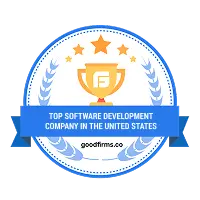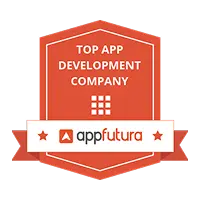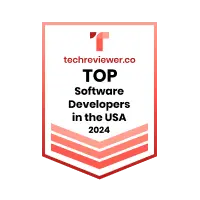ERP System
A modern ERP system designed to reshape daily operations, improve team collaboration, and simplify complex business processes
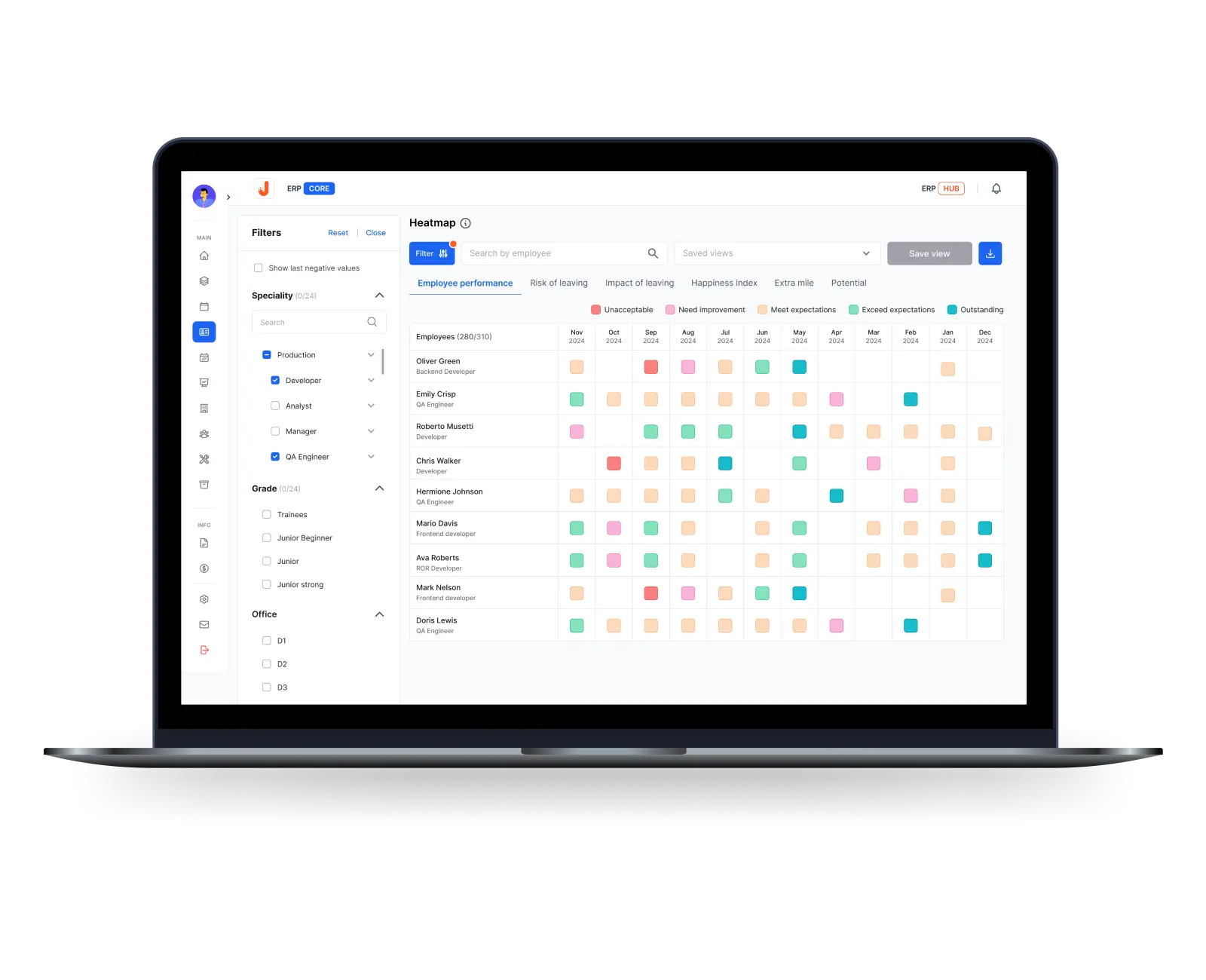
Technologies
Ruby on Rails, React
Industry
HR Tech
Engagement Model
Dedicated Team
Platform
Web
Team
15 members
Timeline
2 years
About the project
Every business reaches a point when data starts snowballing, and managing everyday processes across departments can become challenging.
At JetRuby, we saw this happening as our team and projects expanded. Documents and tasks were scattered across platforms, and data lived in its own fragmented islands.
So, we decided it was time for change. We needed something unified, a single system to bring everything together in real time: project and people management, HR operations, finance, communications, and more.
Our enterprise resource planning platform (ERP) was born from this vision. Instead of plugging in some generic existing systems, we decided to build an ERP system that would mirror our unique needs, values, and goals.
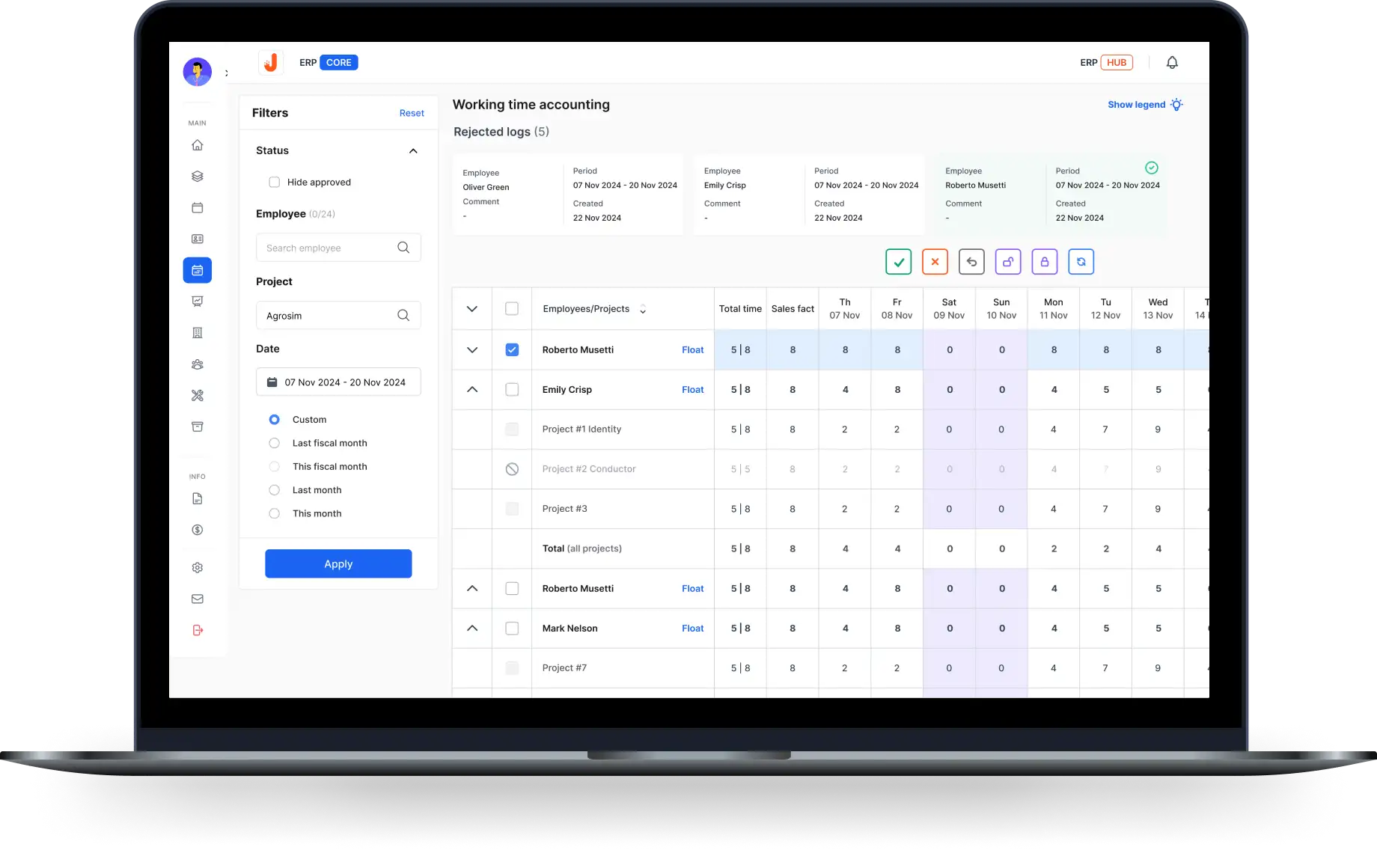
The resulting solution is as much a part of our team as any project manager or HR specialist. Here’s what it offers:
- A single, centralized system for tracking project risks, status updates, and emerging opportunities. Everything teams need to stay aligned and on target.
- An internal communication space, a rewards program, and a company currency marketplace designed to strengthen our workplace culture and help everyone feel connected to our shared mission.
- Custom forms for everything from time-off requests to access requests. Employees can get what they need from HR and back-office support without the usual back-and-forth.
- A powerful analytics tool that unifies data from multiple sources, ensuring accurate and up-to-date information. Plus, it syncs with BI systems to support data-driven decisions.
- Tools to track productivity, monitor workflows, and support employee motivation. A streamlined approach to keep teams engaged and improve retention.
- A resource manager’s assistant that makes it easy to allocate resources across projects without overloading, burnout, or underusing team members.
- A simple, integrated time tracker that syncs with sick leave and vacation modules. Real-time tracking for planned vs. actual hours worked.
- An interactive org chart that clarifies team hierarchies and gives access to relevant data based on roles. Each department gets dedicated HR support for that personal touch.
Project objectives
Our goal was to create a platform that was easy to use, tailored for our team, and equipped with tools that enhance transparency.
This platform would serve as a single source of truth for the entire organization and foster a collaborative spirit inside the company. It would be a system our team could rely on, helping us stay focused and connected across projects, departments, and day-to-day tasks.
We had a few key requirements in our implementation plan:
Centralized access
Employees needed a single entry point to access documents, log work hours, and handle HR requests.
Unified project management
We wanted a platform that would give every team member, from executives to developers, a clear view of project timelines, potential risks, and new opportunities.
Encouraging engagement
We wanted our employees to blog about their work, earn Jetcoins (our internal currency), and browse a rewards marketplace.
Automated HR processes
Our team needed an ERP that would provide automation for leave requests, payroll, back office, and other tasks.
Reliable data aggregation
We wanted an ERP solution that could gather and verify data from finance, HR, and project management, ensuring that every decision is backed by solid, real-time numbers.
Resource allocation
Balancing workloads was another priority. The ERP’s resource management features could help managers allocate tasks without burning anyone out.
Our Work
To ensure our ERP success, we first defined requirements and conducted product research. This implementation process helped us understand possible pitfalls and define further steps.
The ERP journey was a true team effort. We gathered insights from every department, applied best practices, tested the features in real-world scenarios, and made sure the platform could adapt to evolving needs.
We needed a unified ERP that would perfectly fit our needs, which meant countless iterations and late-night brainstorming sessions.
At first, we had two separate teams working on different solutions. We knew our ERP project needed two main components to be truly effective: CORE and HUB.
They are both designed to be mobile-friendly, accessible, and centered around our team’s needs.
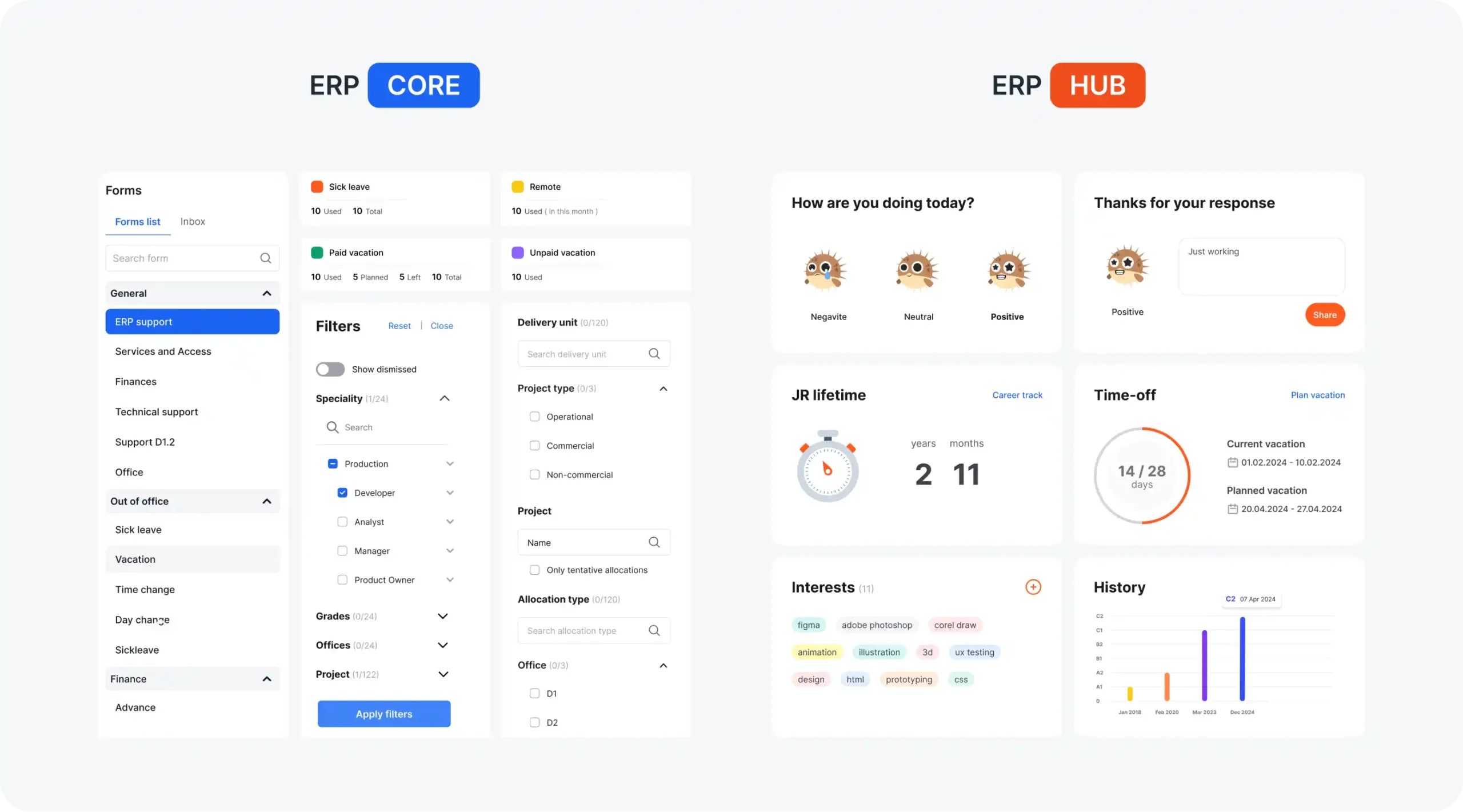
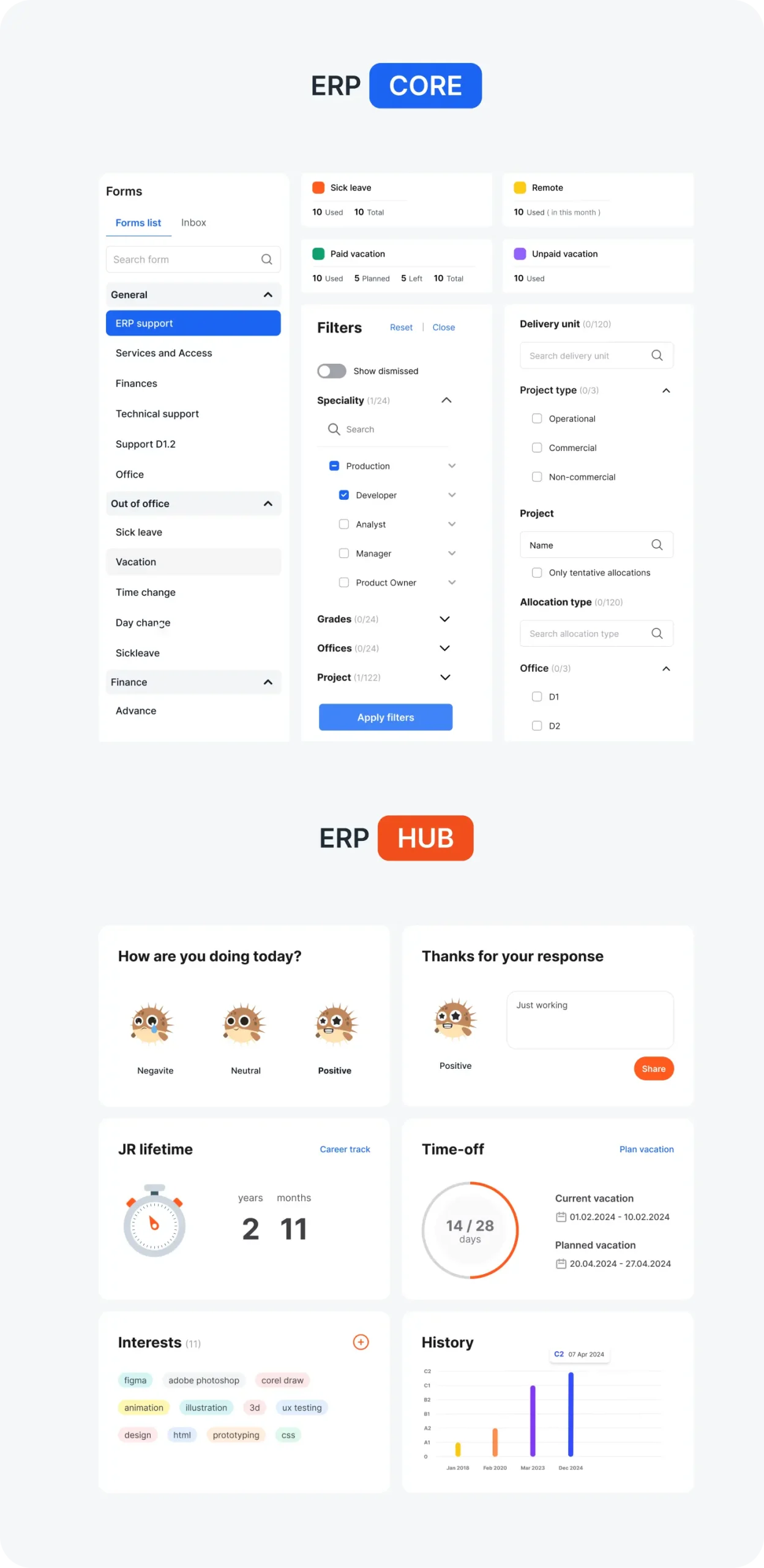
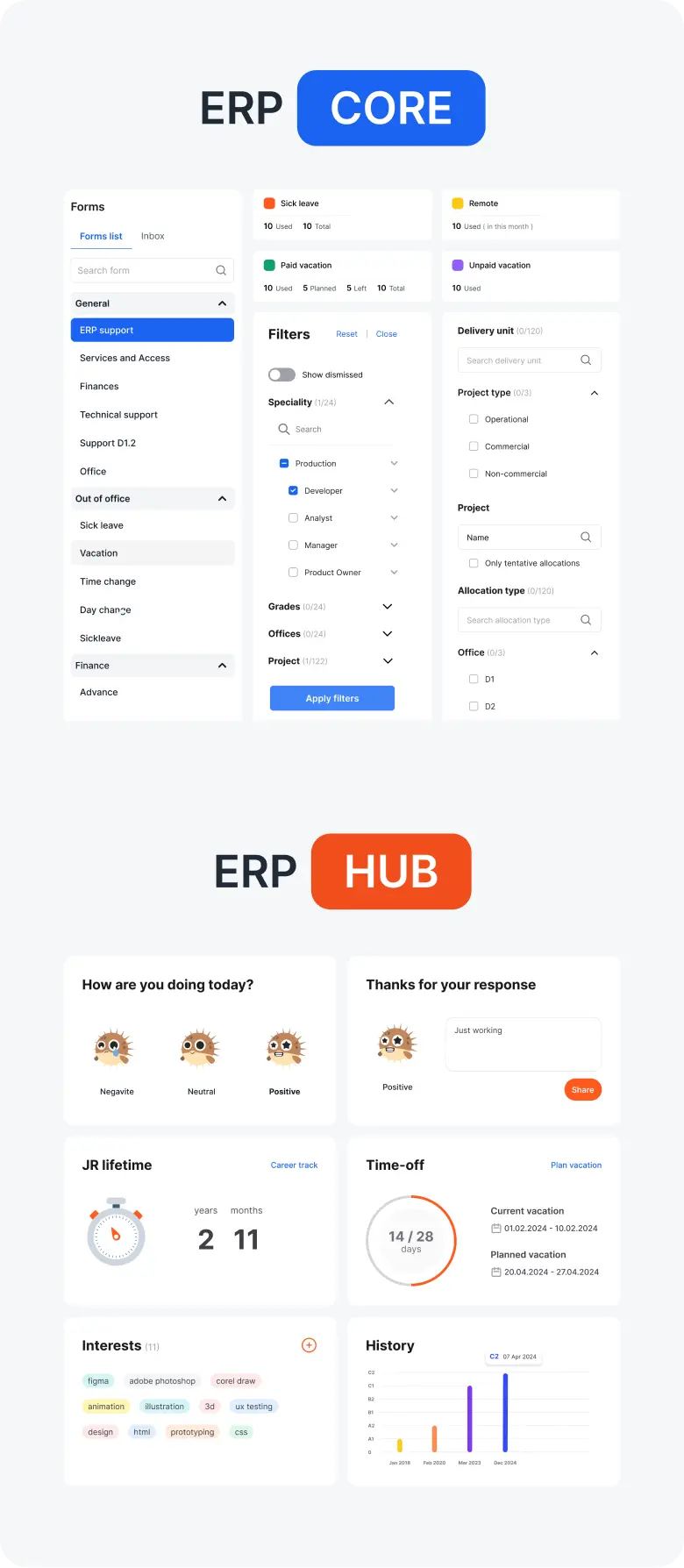
CORE became the heart of day-to-day requests, with forms that employees can fill out when they need things like:
- Access to specific services or documents
- Help with financial questions
- Anything related to office needs
- Requests for sick leave, vacation, time-off adjustments
- And any other questions that don’t quite fit into other categories, like user experience feedback
We originally intended HUB to be a customer-facing space where clients could learn about our development team and evaluate their skills. But as we worked on it, we realized that HUB had the potential to be a space for communication, connection, and engagement among our team members.
We made a pivot and transformed HUB into a tool that fosters collaboration and interaction.
Now, HUB allows delivery and resource managers to find specialists with specific skill sets and experience while also providing a place for team members to share internal materials, company updates, and news.
Once we launched HUB, we faced a new question.
How could we deepen our focus on employee engagement and personal growth?
We needed a system that went beyond everyday tasks and truly supported our people. This meant digitizing our approach to people management.
The complexity of this task made us realize that combining the CORE and HUB teams would create even greater synergy.
The first major feature that bridged CORE and HUB was our People Management module. We built tools like a heatmap to examine employee engagement, performance, and development over time.
We also added a mood map. It’s a simple yet effective way for employees to share their feelings and workflow bottlenecks.
Each team member can rate their mood and flag any issues or challenges. Plus, they can easily schedule one-on-one meetings, giving managers and employees a direct line for meaningful check-ins.
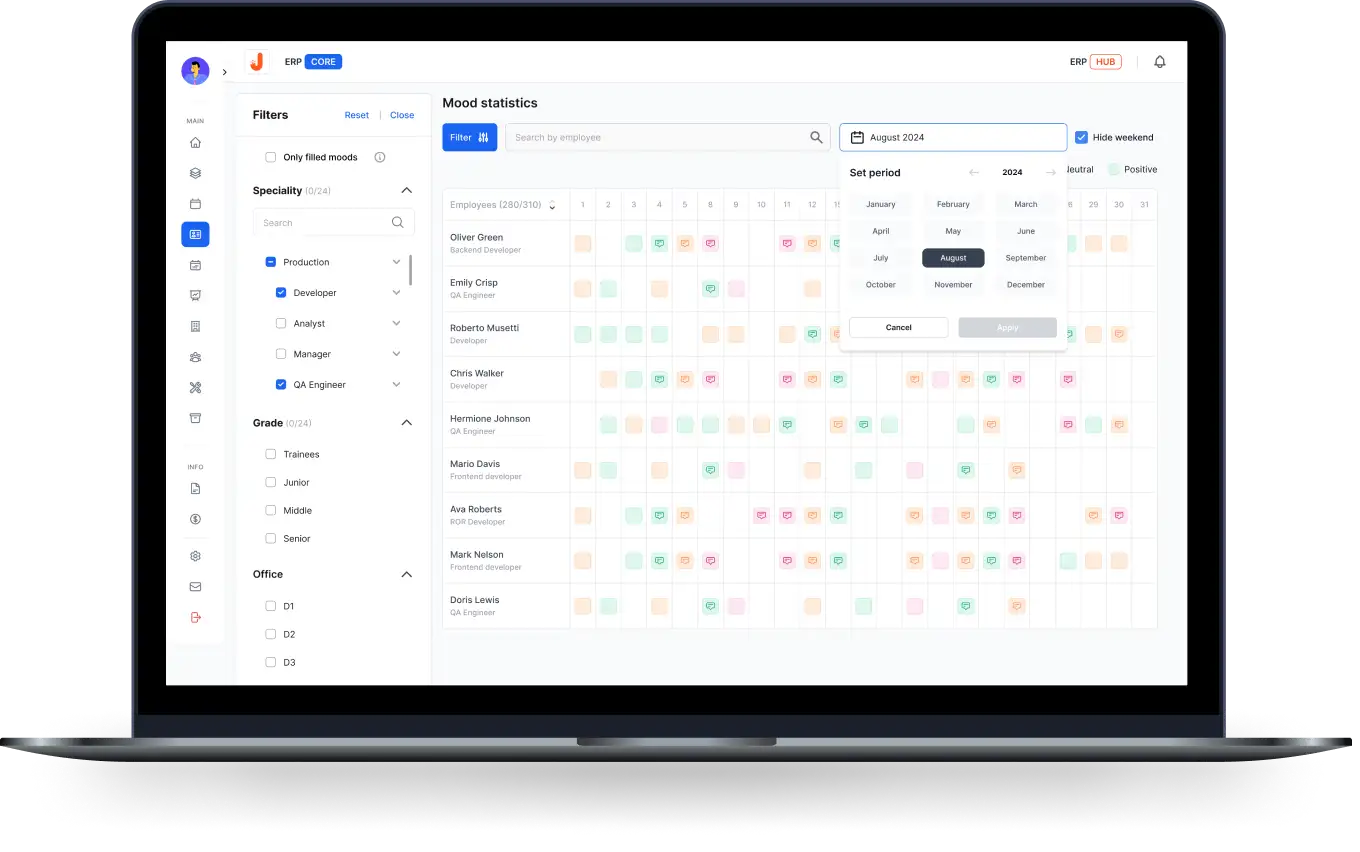
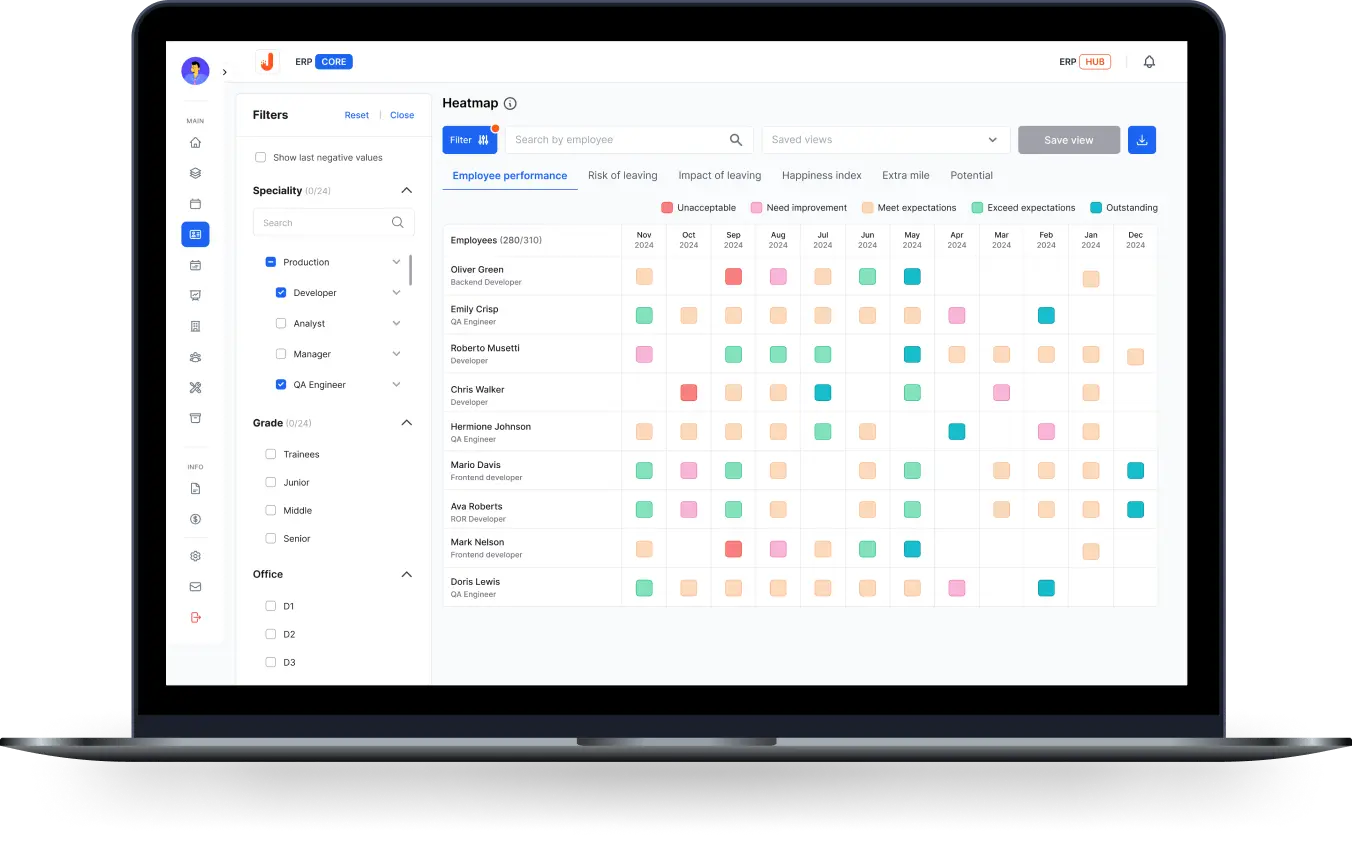
Then, we introduced an Office Manager Dashboard. It helps track attendance, vacation, leave, sick days, remote work days, and time-off transfers. All of this is seamlessly connected with other systems, so payroll is accurate and up-to-date.
To give managers a clear view of project progress and team workloads, we created employee Tables synchronized with Jira.
This brought all project data tracking into one place, where project managers and department heads can check whether hours are tracked and projects are on schedule.
All the information is in one view, showing what’s confirmed and what needs to be billed. It’s fast and easy to navigate and has options for filters, comments, and more.
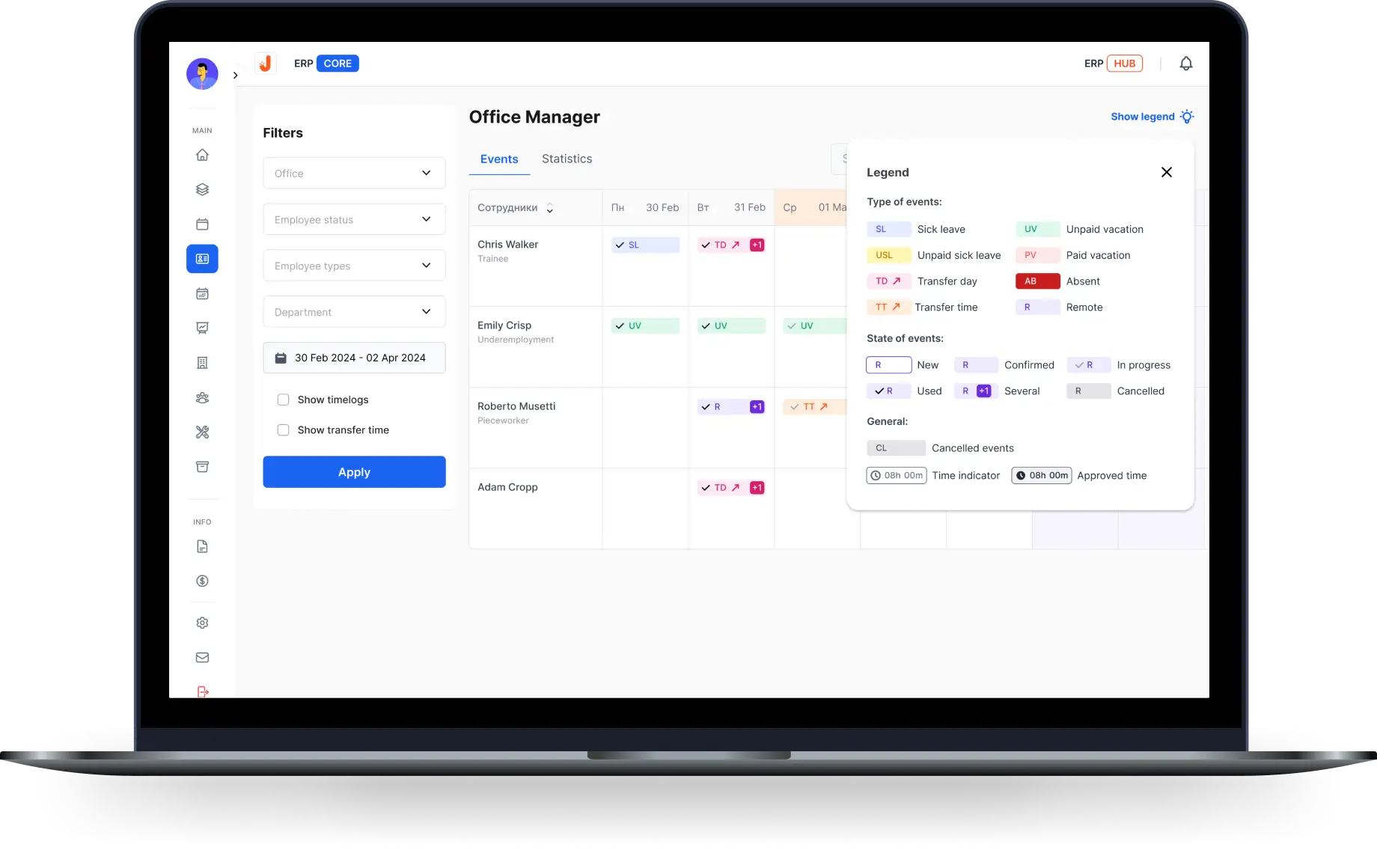
We also added RMO (Resource Management and Optimization), a tool that gives managers detailed access to team information. Unit managers can monitor assigned experts and their performance, while department heads can view activities across the entire team.
This gives managers real-time insight to provide meaningful feedback, and it’s fully integrated with our people management system.
For team collaboration, we created an Outline space to replace Confluence. It’s a shared workspace for storing documents and essential info. This small but powerful addition makes accessing shared resources much easier.
To keep everything secure, we introduced an identity management system called KeyCloak. It provides single sign-on access across HUB, RMO, Outline, and other modules, keeping data secure while ensuring every user has the access they need.
When AI tools like ChatGPT started taking off, we saw an opportunity to integrate it through an API, allowing employees to access AI-driven support directly within our corporate account.
We integrated a new system called Superset BI, to visualize data with graphs and dashboards so managers can see the bigger picture at a glance.
We also created a Project Stages Analysis feature that automates the project tracking process. It pulls data from Pyrus, saving a huge amount of time and reducing human error in our reports.
So, after all this work, we now have an effective ERP system that includes 11 modules:
- People Management
- HUB
- Outline
- Tables
- RMO
- Pyrus
- Forms
- KeyCloak
- Payslips
- Superset BI
- Project Stages
As we moved forward, we’re constantly asking ourselves: How can we keep improving? How can we keep evolving?
For that, we implemented Value Streams. These are four guiding principles, each with a specific focus:
This is all about employee satisfaction and development, including training, certifications, new skills, and improving retention.
This principle ensures fast access to all business metrics and financial systems and data, so our team can make informed decisions quickly.
This focus area keeps project status clear and transparent, making it easy to stay on track.
This value stream is about setting consistent and unified standards and business processes for managing our business. This standardization creates an efficient, cohesive approach across teams that ensures business growth.
Results
The project has been developing for over five years now. Our ERP system has proved to be a top-notch platform that demonstrates superior business value.
- Over 200 employees are already using our ERP system daily
- A team of 20+ dedicated engineers, testers, and analysts constantly enhances it with new modules.
- With 15+ years of experience in managing people and projects.
Here are the key ERP platform modules available to our employees:
- Hub or an internal social network to keep us connected
- Personal profile and workspace to keep everything organized
- Marketplace and internal bonus system for rewards and recognition
- Appreciation module to celebrate each other’s contributions
- Feedback module to keep communication open and honest
- Time tracking module that’s simple and easy to use
- Forms module to handle internal requests seamlessly
- Employee rewards module for acknowledging achievements big and small
For top managers, the ERP platform includes tools that make leading teams and projects easier:
- HR record-keeping to store essential data in one place
- Time tracking overview to see how time is spent across teams
- Project management office to track project progress from start to finish
- Resource management to balance workloads and optimize staffing
- People management to stay connected to the needs of each team member
Our work is underway to implement new features and functionality enhancements.
And we have some additional goals to achieve:
Quarterly reporting
We aim to shorten the reporting time from 45 days to just 3, making data available faster so we can act on it sooner.
Unified data access
We want to bring everything into a single database, including workload planning, time tracking, invoicing, and compensation This will help managers see a clear, real-time picture of goals and progress throughout the quarter.
Integrated reporting
We’ll consolidate all reporting systems within the ERP to save countless hours of manual work each quarter.
Easier time tracking
We’re making time tracking so simple and visual that employees won’t ever have to search for the “right task” again.
Top-rated B2B software development company with a proven track record
We look forward to discussing your ideas and bringing them to life
By submitting request you agree to our Privacy Policy

